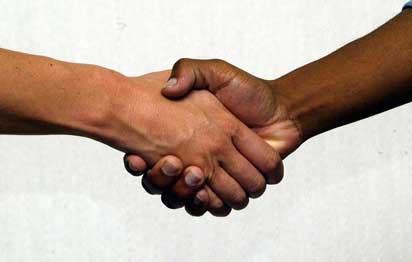Collectively, we need to counter this movement, maintain our humanity, and celebrate the fact that people from many religions and cultures around the world have contributed to Humankind’s incredible progress over thousands of years. Algebra came from Persia and the Mid-East in the 9th century and now we have super-advanced mathematics. The telephone came from Canadians in 1849, and look at where we are today with smart phones. German Melitta Bentz invented the coffee filtration system in 1908. Then there’s fusion cuisine, which is simply amazing, and the list goes on.
This article is meant to offer perspective on cultural uniqueness, and the handshake and other forms of greeting is a good place to start. By no means is this a full cultural thesis, nor is it meant to be. It is simply meant to celebrate cultural diversity and help “us” understand why sometimes “we” do and sometimes “we” don’t.
Five Different Cultural Greetings
If all of us could increase our awareness of how greetings are exchanged in different countries, cultures, and religions it could help turn suspiciousness and awkwardness into harmony and acceptance. Here are a mere five different greetings from around the world.
1) The Handshake. A handshake is intended to express friendliness on greeting and to show friendship. In medieval times, the alternative was a hand with a dagger or a sword coming out at you. Recently the handshake that has received a lot of attention and press coverage over U.S. President Donald Trump’s “long, shake, and tug” handshake, coined as the “Trump Tug.” He pulls the other person’s hand in towards his body, and sometimes shakes and holds for a prolonged period of time. This YouTube video from Expound Now offers a great snippet:
https://www.youtube.com/watch?v=tGjUJedh0lA
Prime Minister Justin Trudeau (who keeps fit by boxing and other activities) seemingly anticipated the “Trump Tug,” while Japanese Prime Minister Shinzo Abe seemed uncomfortable after the handshake. The question, is it a “power play” handshake, bringing you into their space and literally destabilizing you or could it be seen as really wanting to be friends with you?
All in all, a friendly handshake is a gesture and extension of friendliness. A firm grip while shaking hands in countries like the U.S. and Brazil may be seen as rude. A “weak” handshake that is polite in a particular country such as Turkey may be seen as in-genuine in another country such as Canada. A long handshake is acceptable in some countries, but awkward in others. In Russia, you typically don’t shake hands with the opposite sex, unless it’s a business setting. There’s more, and the Business Insider Infographic is a great starting point:
http://www.businessinsider.com/how-to-properly-shake-hands-around-the-world-2015-3
Other Physical Greeting Gestures
Many cultures do not shake hands at all, people perform other greeting gestures. Some don’t shake hands with the opposite sex because of piety and religious beliefs. Others simply don’t want to shake hands because it’s a sure fire way to exchange germs!
2) The Bow. In Asia, physical contact is generally kept to a minimum when greeting. It is not to be confused with clasping the hands together at the chest – a gesture which is used to express gratitude. A polite greeting in Japan involves no handshake, rather a gentle bow. This form of greeting respects one’s personal space. More detail is provided on the Japan National Tourism Organization website:
http://www.jnto.go.jp/eng/indepth/exotic/lifestyle/bow.html
3) The Fist in Palm. In China, typically there is no handshake either, although 100 years ago, it was introduced. There is a fist in palm salute, “Bao Quan” coming from Chinese martial arts and steeped in history, over 3,000 years for that matter (source: Top China Travel website page):
http://www.topchinatravel.com/china-guide/chinese-etiquette-fist-and-palm-salute.htm
4) The Head Bow (no eye contact). Out of respect for the opposite sex, individuals of certain religious faiths may touch (shake hands, hug, kiss on cheeks) the same sex to greet, but will acknowledge the opposite sex their head lowered and a gentle head bow. This is the case with observant Muslims and Jews. Don't take it the wrong way if you’re a woman and a man is shaking men’s hands and they don’t shake yours. Acknowledge with a friendly nod. Contact, both physical and eye is avoided out of respect for the opposite sex. Here’s some insight on the observant Muslim perspective (source: Talk to Islam website):
http://talktoislam.com/14/why-dont-muslim-men-shake-hands-with-women
And here’s some perspective on the observant Jewish greeting practices (source: Frum Satire web page):
http://www.frumsatire.net/2012/02/13/why-i-dont-shake-hands-with-the-opposite-sex/
5) Cheek or Air Kisses. This is my favourite type of greeting usually done in social environments. I do, however, get confused with the number of kisses and on which side to start! Close calls of ‘almost in the middle’ can happen, just follow your host’s lead and you should be good. If it’s a cheek kiss, no saliva, and if it’s supposed to be an air kiss, keep it that way.
There are so many differences here too. A few countries are listed below:
a. In Ecuador, it’s one kiss amongst women, on the right cheek
b. In Spain, it’s two kisses, starting with the right cheek
c. In France, “la bise” is also two kisses, but starting with the left cheek, except in Provence where it’s three, and Nante, four
d. In Italy and Hungary, it’s two, on which side to start, not sure!
e. In the Netherlands, Belgium, Egypt, Slovenia, and Switzerland, it’s three, really not sure on which side to start! In Lebanon, it’s also three, starting on the left cheek, but in Syria it’s also three starting with the right cheek
f. In (French) Canada, it’s two, as it is in Turkey, which side, your guess
The important thing in all of these greetings is the warm intention to connect. Cultures are so rich and understanding more of them enriches us.
I hope you enjoyed this light-hearted article. I would love to hear your thoughts or more about greeting types and etiquette from around the world.
Thank you. Merci.

 RSS Feed
RSS Feed
